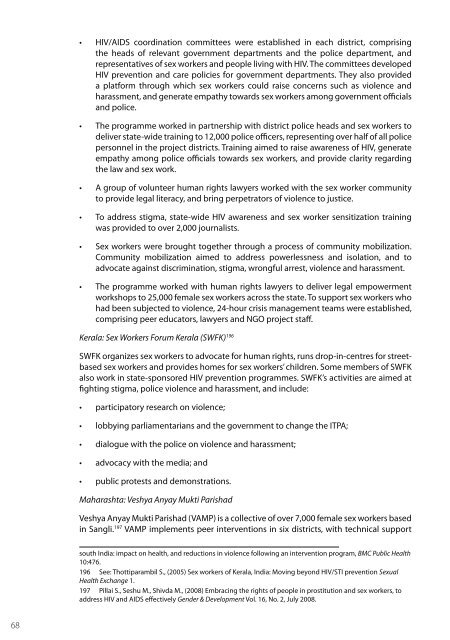SEX WORK AND THE LAW - HIV/AIDS Data Hub
SEX WORK AND THE LAW - HIV/AIDS Data Hub
SEX WORK AND THE LAW - HIV/AIDS Data Hub
Create successful ePaper yourself
Turn your PDF publications into a flip-book with our unique Google optimized e-Paper software.
<strong>HIV</strong>/<strong>AIDS</strong> coordination committees were established in each district, comprising<br />
the heads of relevant government departments and the police department, and<br />
representatives of sex workers and people living with <strong>HIV</strong>. The committees developed<br />
<strong>HIV</strong> prevention and care policies for government departments. They also provided<br />
a platform through which sex workers could raise concerns such as violence and<br />
harassment, and generate empathy towards sex workers among government officials<br />
and police.<br />
The programme worked in partnership with district police heads and sex workers to<br />
deliver state-wide training to 12,000 police officers, representing over half of all police<br />
personnel in the project districts. Training aimed to raise awareness of <strong>HIV</strong>, generate<br />
empathy among police officials towards sex workers, and provide clarity regarding<br />
the law and sex work.<br />
A group of volunteer human rights lawyers worked with the sex worker community<br />
to provide legal literacy, and bring perpetrators of violence to justice.<br />
To address stigma, state-wide <strong>HIV</strong> awareness and sex worker sensitization training<br />
was provided to over 2,000 journalists.<br />
Sex workers were brought together through a process of community mobilization.<br />
Community mobilization aimed to address powerlessness and isolation, and to<br />
advocate against discrimination, stigma, wrongful arrest, violence and harassment.<br />
The programme worked with human rights lawyers to deliver legal empowerment<br />
workshops to 25,000 female sex workers across the state. To support sex workers who<br />
had been subjected to violence, 24-hour crisis management teams were established,<br />
comprising peer educators, lawyers and NGO project staff.<br />
Kerala: Sex Workers Forum Kerala (SWFK) 196<br />
SWFK organizes sex workers to advocate for human rights, runs drop-in-centres for streetbased<br />
sex workers and provides homes for sex workers’ children. Some members of SWFK<br />
also work in state-sponsored <strong>HIV</strong> prevention programmes. SWFK’s activities are aimed at<br />
fighting stigma, police violence and harassment, and include:<br />
<br />
<br />
<br />
<br />
<br />
participatory research on violence;<br />
lobbying parliamentarians and the government to change the ITPA;<br />
dialogue with the police on violence and harassment;<br />
advocacy with the media; and<br />
public protests and demonstrations.<br />
Maharashta: Veshya Anyay Mukti Parishad<br />
Veshya Anyay Mukti Parishad (VAMP) is a collective of over 7,000 female sex workers based<br />
in Sangli. 197 VAMP implements peer interventions in six districts, with technical support<br />
south India: impact on health, and reductions in violence following an intervention program, BMC Public Health<br />
10:476.<br />
196 See: Thottiparambil S., (2005) Sex workers of Kerala, India: Moving beyond <strong>HIV</strong>/STI prevention Sexual<br />
Health Exchange 1.<br />
197 Pillai S., Seshu M., Shivda M., (2008) Embracing the rights of people in prostitution and sex workers, to<br />
address <strong>HIV</strong> and <strong>AIDS</strong> effectively Gender & Development Vol. 16, No. 2, July 2008.<br />
68
















